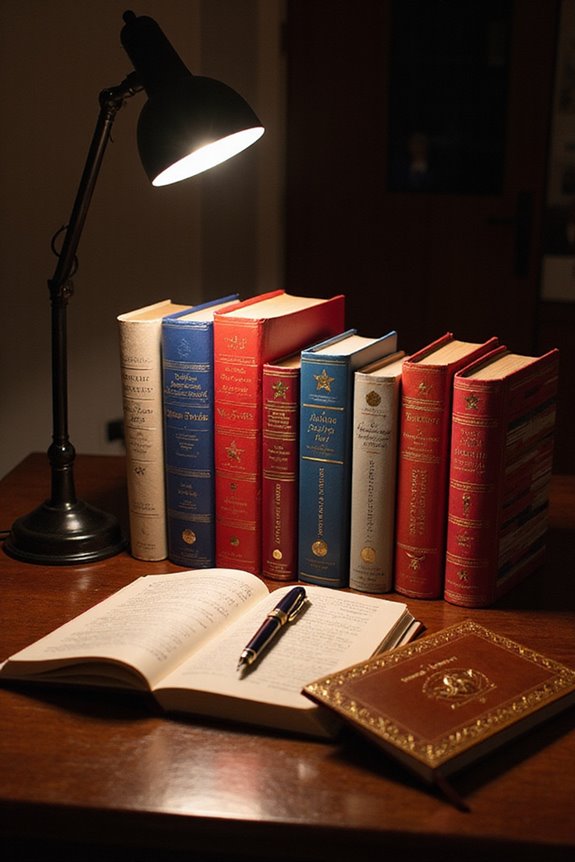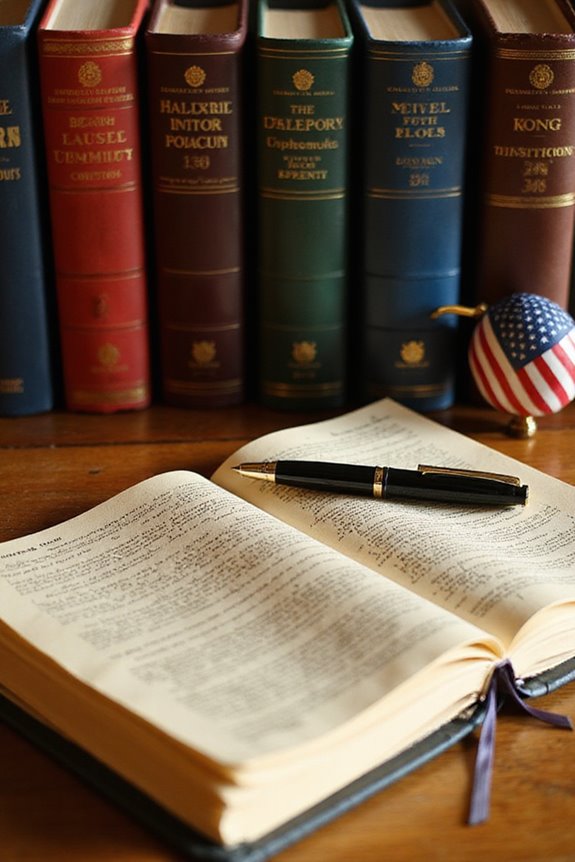Some of the most popular political books include:
- *Looking at Women Looking at War: A War and Justice Diary* by Victoria Amelina.
- *The Nazi Mind: Twelve Warnings From History* by Laurence Rees examines historical ideologies.
- *How Trump Retook the White House* details recent electoral dynamics.
These titles provide insights on pressing issues. They offer perspectives that shape our understanding of political landscapes. More remarkable works on this topic await your interest as we explore further.
Key Takeaways
- *Fear* by Bob Woodward sold 1.1 million copies in its first week, showcasing its widespread impact and popularity in political literature.
- Classic political works like *The Prince* remain enduring favorites, with over 371,000 ratings on Goodreads highlighting their continued relevance.
- Recent award-winning titles such as *Looking at Women Looking at War* by Victoria Amelina emphasize pressing social issues and draw significant reader interest.
- Shortlisted books for the Orwell Prize, like *The Nazi Mind* and *Europe Without Borders*, engage readers with their exploration of critical political themes and historical analysis.
- Anticipated releases, including *Fight: Inside the Wildest Battle for the White House*, promise to capture attention and shape ongoing political discourse.
The Orwell Prize: Celebrating Political Insight
The Orwell Prize stands as a beacon of excellence in political literature, celebrating works that embody George Orwell’s vision of political writing as an art form. Since its establishment in 1993, the Prize recognizes outstanding political narratives that reflect Orwell’s influence on contemporary discourse.
Key elements of the Prize include:
- Categories: Awards are given for Political Fiction, Political Writing, Journalism, and Exposing Britain’s Social Evils.
- Purpose: It aims to highlight significant social and political issues through high-quality narratives, including novels, essays, and memoirs. This focus on critical thinking fosters a deeper understanding of the complexities of political engagement.
- Judging: Annually adjudicated by independent panels, ensuring diverse perspectives and fresh evaluations. In addition, the Prize has evolved to include new categories and broaden its scope over time.
Through these efforts, the Prize reinforces the importance of political literature in shaping public understanding and engagement.
Shortlisted Works for 2025

As we explore the shortlisted works for 2025, it’s evident that this year’s selections reflect a diverse range of political themes and contexts. The shortlisted authors have provided us with compelling political insights that address contemporary issues. Notably, the winner of the Orwell Prize for Political Writing, *Looking at Women Looking at War: A War and Justice Diary* by Victoria Amelina, exemplifies this with its focus on the impact of war on women’s lives.
Key titles include:
- *The Nazi Mind: Twelve Warnings From History* by Laurence Rees, with a 4.27 Goodreads rating.
- *Europe Without Borders: A History* by Isaac Stanley-Becker, analyzing modern European developments.
- *How Trump Retook the White House and the Democrats Lost America* by Josh Dawsey and others, investigating the recent U.S. election. These books also encourage readers to engage in critical political discussions that enhance understanding of complex ideologies.
These works not only engage with pressing political discussions but also highlight the importance of understanding historical and current events in shaping our political landscape. Each book offers unique perspectives and valuable lessons for readers.
Recent Notable Releases in Political Writing

In recent months, we’ve seen a surge of notable releases in political writing that reflect a wide array of themes and perspectives. Key titles include:
- The Nazi Mind by Laurence Rees, which explores the psychological factors that shaped Nazi ideology.
- Europe Without Borders by Isaac Stanley-Becker, tracing the historical context of a borderless Europe.
- On Tyranny by Timothy Snyder, offering insights into resisting authoritarian regimes.
- Who Is Government? edited by Michael Lewis, analyzing the complexities of governmental structures.
These works not only engage with contemporary issues but also provide essential historical context, making them relevant to today’s political landscape. As we immerse ourselves in these narratives, we gain valuable insights into the psychological factors influencing our societies. Additionally, the exploration of topics like the challenges of democracy can help us understand the current political climate. The emphasis on theological integrity in political discourse encourages readers to critically assess the values that shape governance.
Anticipated Titles for the Coming Year

Anticipating the upcoming year, we can look forward to several remarkable political titles that promise to enrich our understanding of power dynamics and historical context.
- *Fight: Inside the Wildest Battle for the White House* will provide insights into presidential race dynamics.
- H.W. Brands’ Washington, American Patriarch is set to offer an extensive view of George Washington’s life, exploring his leadership challenges and the impact of his decisions on modern governance.
- Michael Patrick Cullinane’s TR, Theodore Roosevelt and the Tennis Cabinet releases in May 2026, focusing on Roosevelt’s presidency.
- A potential biography of James and Dolley Madison remains anticipated.
- Political critiques, such as Abundance, address frustrations with government inaction and propose fresh solutions. Additionally, the bipartisan nature of public service will be highlighted in upcoming works, showcasing the importance of collaboration in governance.
These upcoming biographies and critiques will greatly contribute to the ongoing discourse surrounding political engagement and history.
Analyzing the 2024 Election Through Literature

How do we navigate the complexities of the 2024 election through the lens of literature? By exploring key political books, we gain insights into 2024 election strategies and political campaign narratives.
- 2024: How Trump Retook the White House and the Democrats Lost America offers a thorough analysis of the election season.
- The Rebels highlights the rise of progressive populism, reshaping Democratic Party strategies.
- Finish What We Started examines the MAGA movement’s influence on contemporary conservatism, reflecting engagement in political discourse as a critical factor in voter mobilization.
These works provide in-depth reporting from political campaigns, revealing voter engagement and motivations. They also discuss how economic factors, along with social media impacts, shape voter demographics. Additionally, many of these books, like Hit em Where It Hurts, emphasize counter-strategies for the Democratic Party during critical times. Together, these narratives illuminate the evolving American political landscape we face in 2024.
Thematic Focus on Conspiracy Theories
Key themes include:
- Historical reinterpretations: Examining events like the JFK assassination and 9/11.
- Government secrecy: Investigating claims of elite manipulation and hidden agendas.
- Psychological drivers: Exploring the origins of conspiracy thinking, often linked to political powerlessness. Additionally, these themes are prevalent in works like *The Trillion-Dollar Conspiracy*, which examines elite control over global events and economies.
Cultural representations, such as *The Da Vinci Code*, also popularize conspiracy narratives. These works not only reflect societal beliefs but also shape public perception, revealing the intricate connection between politics and psychology in our understanding of conspiracies.
War, Justice, and Memoirs in Political Discourse
War, justice, and memoirs form an essential nexus in political discourse, as we explore their intertwined themes and implications.
- War Narratives: Books like *All Quiet on the Western Front* and *War and Peace* illustrate the human cost of conflict, shaping public understanding of warfare. Political thrillers, such as The First Gentleman, also engage readers by blending suspense with political drama.
- Justice Perspectives: *Looking at Women Looking at War* offers insights into the intersection of gender and justice during conflicts, while *The Origins of Totalitarianism* examines justice within oppressive regimes.
- Memoir Insights: *At the Edge of Empire* provides a personal lens on international relations and justice, highlighting the complexities of political ethics.
Together, these works contribute to a deeper understanding of how war, justice, and personal experiences inform political discourse today.
Cultural Impact of Political Nonfiction
These narratives not only inform us but also inspire movements for social change, emphasizing the essential role political nonfiction plays in fostering awareness and understanding of societal issues. For instance, books like “One Person No Vote” highlight the history of voting rights and the ongoing struggle against voter suppression, illustrating how literature can galvanize efforts to protect democracy.
Reader Engagement and Popularity Metrics
Understanding how readers engage with political books is vital for evaluating their impact and popularity. By examining reader trends and engagement metrics, we can better understand what resonates with audiences.
- Ratings and Reviews: Books like “Between the World and Me” boast an impressive average rating of 4.40 on Goodreads, showcasing strong reader approval.
- Shelf Counts: Titles such as “The Dictator’s Handbook” are shelved over 955 times, indicating significant interest in political literature.
- Sales Figures: Bob Woodward’s “Fear” achieved 1.1 million copies sold in its first week, exemplifying successful reader engagement. In addition, classics like *The Prince* have garnered over 371,000 ratings, demonstrating their enduring popularity.
- Social Media Influence: Platforms like Twitter amplify discussions and reviews, further impacting a book’s popularity.
These metrics provide essential insights into how political literature captures the attention of readers.
Academic Interest in Political Literature
As academic interest in political literature evolves, we see a significant shift towards understanding complex dynamics within political systems. Researchers increasingly employ interdisciplinary approaches, integrating culture, rationality, and structure in comparative politics. This trend aligns with the rising prominence of the “new institutionalism” approach, focusing on institutions’ roles in political behavior.
Key developments include:
- Enhanced methodologies, including survey-based and bibliometric analyses, to assess voter behavior.
- A growing emphasis on digital campaigns and negative campaigning, reflecting shifts in political strategy.
- Active engagement with top journals like American Political Science Review showcasing the dynamic nature of political literature.
These trends illustrate a robust academic landscape where diverse political methodologies foster deeper insights into the intricacies of political life. Additionally, recent studies have revealed significant shifts in research focus over time, highlighting the major trends that continue to shape political science discourse.
Frequently Asked Questions
How Are the Orwell Prize Winners Selected Each Year?
Each year, we observe a rigorous selection process for the Orwell Prize, where esteemed judges evaluate nominees based on prize criteria like relevance, literary merit, and political impact, ultimately recognizing impactful contributions to political literature.
What Criteria Define a Political Book for This Award?
When we ponder what makes a political book worthy, we find criteria evaluation hinges on thematic relevance and excellence in style, ensuring these works resonate deeply with society’s pressing issues and ignite meaningful discussions.
Are There Any Upcoming Political Book Fairs or Events?
We’ve got some exciting upcoming events and political fairs lined up, like the London Book Fair and Political BookFest in D.C. Let’s explore these opportunities to engage with influential political literature together!
How Can Readers Participate in the Orwell Prize Voting Process?
We can’t directly participate in the Orwell Prize’s voting process, but we can engage as readers by discussing and promoting shortlisted works, staying informed about updates, and attending related events to support the literary community.
What Impact Do Political Books Have on Society?
Political books can ignite revolutions in our minds, enhancing political literacy and driving societal change. They unravel complexities, inspire activism, and illuminate paths toward justice, shaping how we comprehend and engage with our world.







